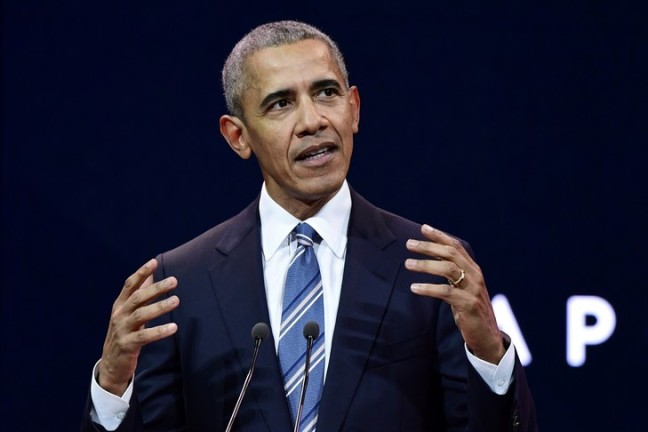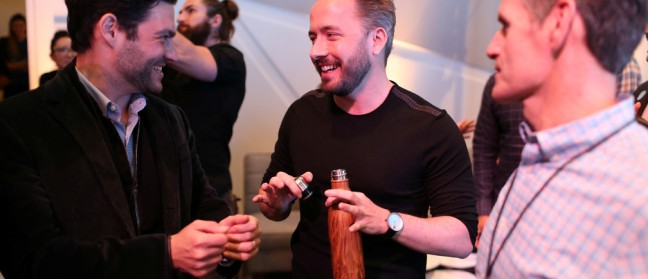De passage à Paris, l’ex-président américain a multiplié les rencontres et fait une conférence devant un réseau d’affaires, le club des « Napoléons ». Il a plaidé pour un ordre international plus juste, puis est revenu sur ses huit années au pouvoir et ses espoirs pour l’avenir.

Barack Obama intervient lors de la conférence organisée par le club « Les Napoléons » à Paris samedi 2 décembre. / Martin Bureau/AFP
Durant quelques heures en France, ce samedi 2 décembre, Barack Obama aura pu avoir l’impression qu’il est toujours président des États-Unis. Il a en effet été accueilli à l’Élysée par Emmanuel Macron, fêté comme un ami que l’on est content de revoir par la maire de Paris Anne Hidalgo, puis chaleureusement applaudi lors de la conférence qu’il a donnée à l’auditorium de la Maison de la Radio. Il y était à l’invitation du club « Les Napoléons », un réseau qui rassemble des professionnels de la communication et du monde des affaires.
Devant quelques centaines d’invités, le 44e président des États-Unis s’est livré à un plaidoyer en faveur d’un ordre international construit autour des idées de liberté, de justice, de tolérance et de dignité de l’homme. Il a mis en garde ceux qui lui ont succédé contre la tentation de diviser et jouer sur les peurs. Cela sans jamais nommer Donald Trump. Mais ses propos sont cependant apparus comme une claire façon de se démarquer du nouveau président américain.
Le contre-pied de Trump
Il l’a fait d’abord sur le climat en déplorant « l’absence temporaire de leadership »des États-Unis sur ce sujet. Ensuite, en appelant à user de « tous les moyens de la diplomatie » pour traiter des crises internationales en cours et à « ne pas fonctionner de manière insulaire ». Enfin, en mettant en garde contre le rôle des réseaux sociaux.
« La technologie change la façon dont nous consommons de l’information. Mais de ce fait, il est aussi plus facile d’entendre ceux qui pensent uniquement comme nous », a déploré l’ex-président américain. « Trop souvent, les réseaux sociaux nous aident à ne plus nous confronter à des opinions basées sur des faits, mais servent à nous renforcer dans nos certitudes ». Là aussi, difficile de ne pas y voir une condamnation de la façon dont son successeur utilise Twitter pour s’adresser à ses partisans.
L’Europe s’occupe « trop de microgestion »
Puis lors d’un dialogue plus libre avec le président du groupe Orange, Stéphane Richard, l’ex-président américain est revenu sur son passage à la Maison-Blanche et les leçons qu’il en tire. « En huit ans au pouvoir, j’ai connu des frustrations. Mais en dépit de cela, j’ai vu de réels progrès ». Et il a cité l’Obamacare car « pour les 20 millions de personnes qui bénéficient de ce système de santé, la situation est bien meilleure aujourd’hui », a-t-il dit.
La conversation a roulé sur l’Europe, à propos de laquelle l’ex-président a regretté qu’elle s’occupe « trop de microgestion » et qu’il a incité à plus d’audace. Il a également parlé de l’Afrique, dont le principal problème reste la gouvernance.
« Trop de leaders africains restent trop longtemps au pouvoir », a constaté Barack Obama de façon peu diplomatique. Mais il a aussi souligné le potentiel de ce continent alors que « certaines des économies qui ont aujourd’hui la plus forte croissance dans le monde sont en Afrique ».
« Élever la voix pour défendre la démocratie »
La rencontre a duré plus d’une heure durant laquelle il n’a cessé d’inviter ses interlocuteurs à s’engager pour construire un monde où « la croissance économique bénéficie à tous ». Soulignant que les progrès passés sont « fragiles, et peuvent toujours être remis en cause » il a lancé : « Tous ceux qui croient en la démocratie doivent le dire et élever la voix ».
Aujourd’hui, Barack Obama se consacre à la fondation qu’il a créée. « Pour le reste de ma carrière, mon but est de faire en sorte que la jeune génération ait envie de s’employer à renforcer les institutions qui permettent à la démocratie de fonctionner », a-t-il dit.
Il a délivré un message d’optimisme, sur le modèle du « Yes we can » qui n’a cessé de l’accompagner.
Croire en la justice, même si on ne la voit pas
En rappelant les mots de Martin Luther King sur la justice qui, même si on ne la voit pas, se trouve derrière l’horizon, il a lancé : « Il faut avoir confiance et être prêt à travailler dans cette direction ».
Il a admis avoir beaucoup appris au cours de ses deux mandats, si bien qu’il était « meilleur président à la fin qu’au début » et serait même « encore meilleur président s’il le redevenait aujourd’hui ».
Ces propos ont déclenché des applaudissements. Mais pour couper court à cette éventualité, Barack Obama a eu cette pirouette : « Si je devais redevenir président, Michelle divorcerait… Donc je n’y tiens pas ».

